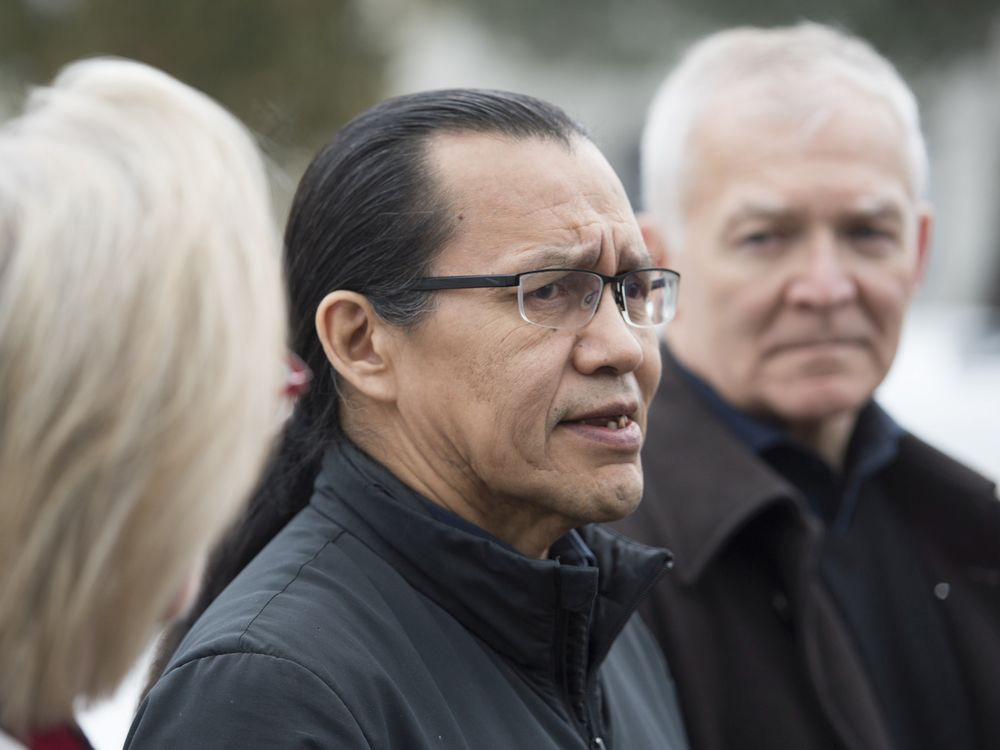The B.C government announced $30 million in funding today to help two neighbouring First Nations in the province’s north move toward implementing rights and title in their territories.
The Wet’suwet’en Nation, which negotiated a memorandum of understanding with the provincial and federal governments in February 2020 aimed at moving toward recognition of rights and title, will receive $7.2 million over three years.
The 2020 agreement was signed after a bitter conflict between Wet’suwet’en hereditary chiefs and the province over the Coastal GasLink pipeline being built in their territory.
Wet’suwet’en Hereditary Chief Woos, Frank Alec, welcomed the funding announcement.
But he blamed the federal government — and not the pandemic — for the “snail’s pace” of negotiations over the past year.
“That’s no excuse,” he said. “They’ve got Zoom and all that technology. I wouldn’t use the pandemic as an excuse.”
The funding will allow the nation to engage at a government-to-government level, Woos said, and marks a “small step” in the decades-long process of defining the nation’s rights and title.
“We’ve got a huge land base and a mass of people that must be included as well,” he added.
The province specifically pointed to the need to support governance, unity building and “ongoing discussions related to the 2020 Memorandum of Understanding” in its funding announcement.
“The three-year funding commitment will support the Wet'suwet'en in their work on governance and the shared goal of reunification within Wet'suwet'en Nation,” it said. “The Office of the Wet'suwet'en, Houses and Clans will undertake an internal engagement process to advance unity-building, which will be inclusive of all Wet'suwet'en House members.”
Signing of last year’s agreement created a rift between the hereditary chiefs, the nation’s traditional leaders and elected chiefs, who said they had been left out of the negotiation process. Many of the elected chiefs had also signed benefit agreements with the pipeline company.
Woos said consulting with band councils, which are tasked with administering services on the nation’s six reserves, will be part of ongoing negotiations.
“There are still challenges,” he said. “I’m not going to pat it down, there are still challenges. We want to be respectful.”
The Tyee was unable to reach any of the nation’s six elected chiefs for comment.
The province also announced $22 million for Lake Babine Nation, in addition to $7 million in funding earlier this year, as part of an agreement announced in September. That agreement created a 20-year framework for implementing rights and title, with $43 million in funding over five years.
The province said it is “accelerating” the funding to support economic initiatives and recovery from the pandemic.
"A key aspect of the foundation agreement is the provision of immediate benefits to Lake Babine Nation that can be deployed to build our economy for the benefit of the Lake Babine Nation people," Chief Gordon Alec said in a statement.
"B.C., by accelerating full payment of these key funds, demonstrates a real commitment to the shared vision we have co-developed."
When signing the agreement in September, Canada’s minister of Crown-Indigenous relations, Carolyn Bennett, called it “a model for the country.” The nation began working on the agreement with the province in 2016 and the federal government joined negotiations two years later.
Alec said the Lake Babine agreement is “totally different” from the Wet’suwet’en process. He said the nation was still determining what its governance system would look like, with discussions between hereditary and elected leadership “ongoing.”
Wet’suwet’en hereditary leadership had just begun engaging with the nation’s membership, through its clans and house groups, when the pandemic hit last spring.
Woos acknowledged that more work is needed in engaging with all houses about how the MOU affects their yintah, or portions of the nation’s territory.
In announcing the funding, the province said it and the nation have been engaging with neighbouring communities and stakeholders through a regional engagement group since September and that a core advisory council has been meeting regularly since February.
“Both are intended to provide critical input and ensure transparency and openness with stakeholders and local government throughout the negotiations,” it said.
How far the current funding will take the nation toward its goal of defining rights and title will depend on engagement from all levels of government, Woos said.
“That remains to be seen because Canada needs to step forward as well,” he said. “Let’s see how everything unfolds after that.”
An emailed statement from the federal Crown-Indigenous Relations department said it had continued to engage in discussions throughout the pandemic, despite the challenges.
“We are working to make sure we get this right, do it in a good way, and in a way that advances Wet’suwet’en visions of self-determination,” it said. ![]()
Read more: Indigenous, Rights + Justice, BC Politics

















Tyee Commenting Guidelines
Comments that violate guidelines risk being deleted, and violations may result in a temporary or permanent user ban. Maintain the spirit of good conversation to stay in the discussion.
*Please note The Tyee is not a forum for spreading misinformation about COVID-19, denying its existence or minimizing its risk to public health.
Do:
Do not: